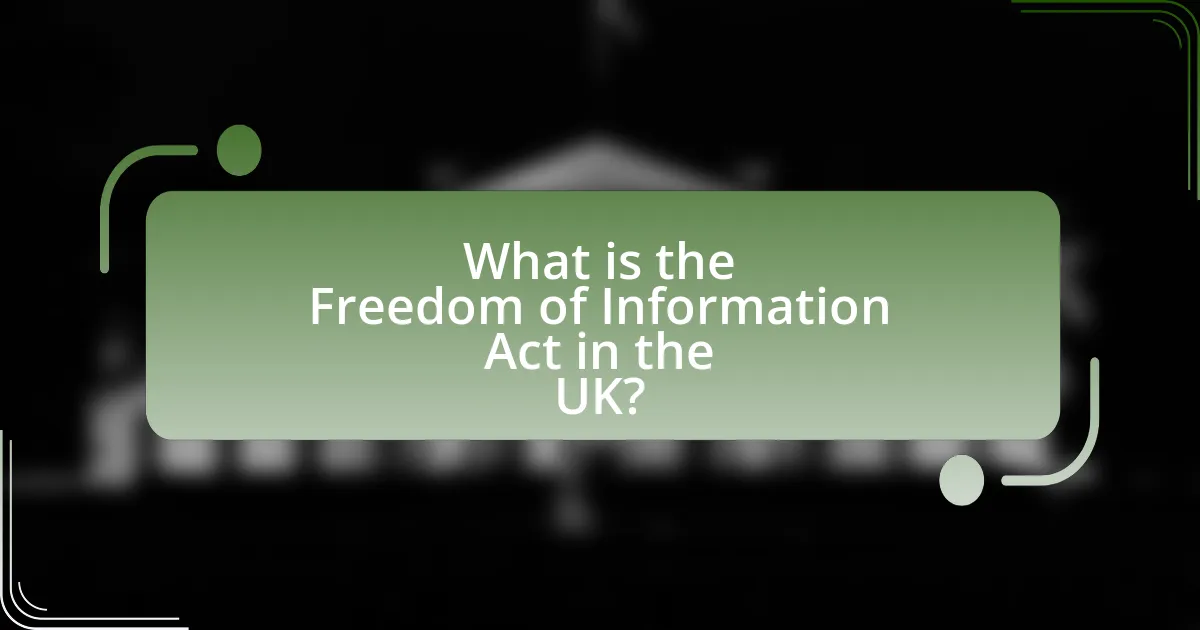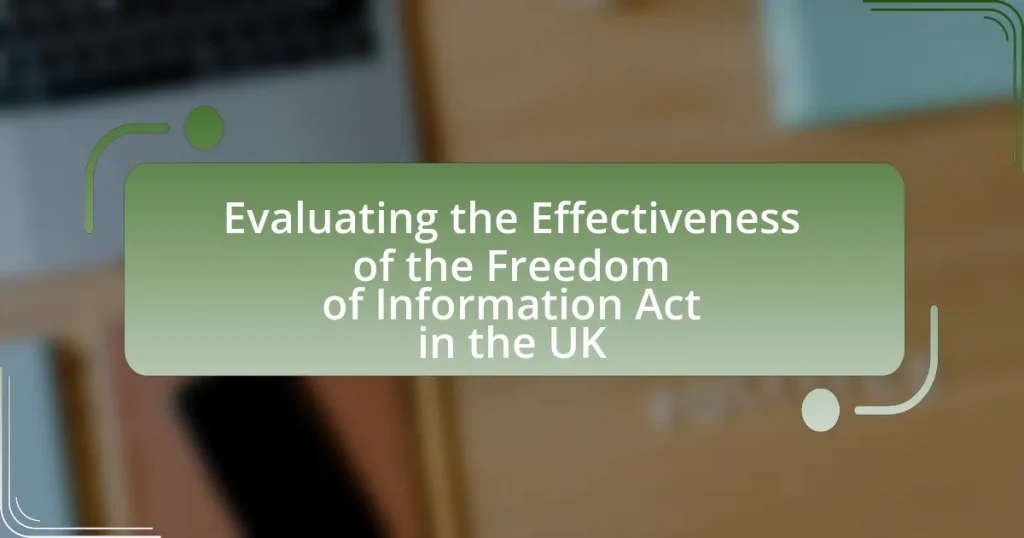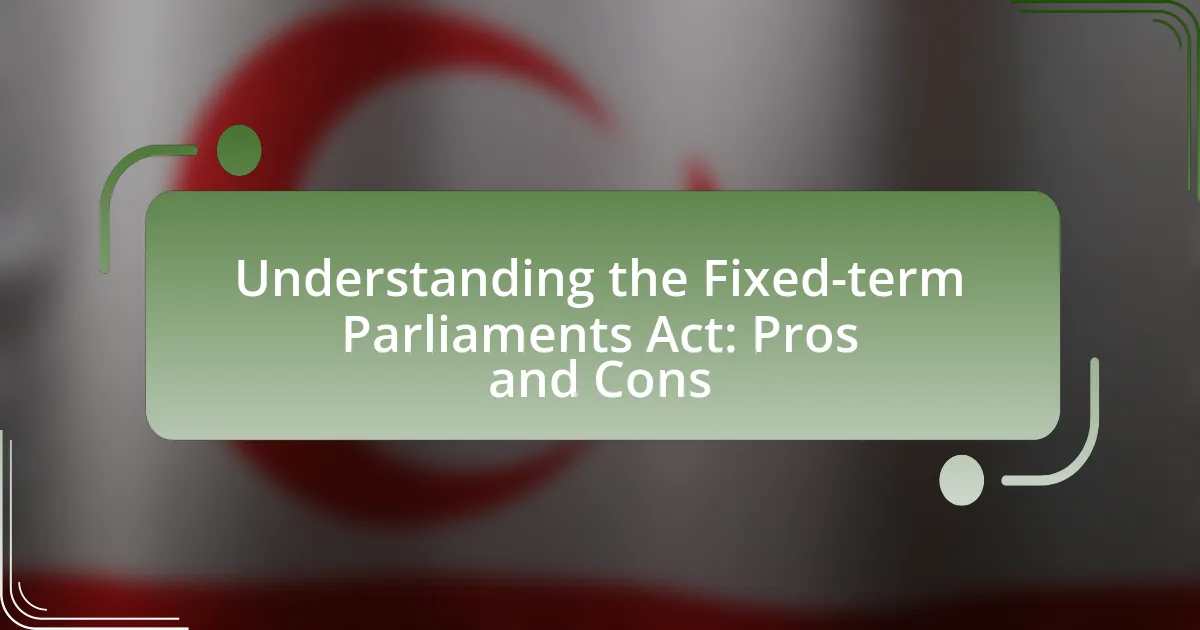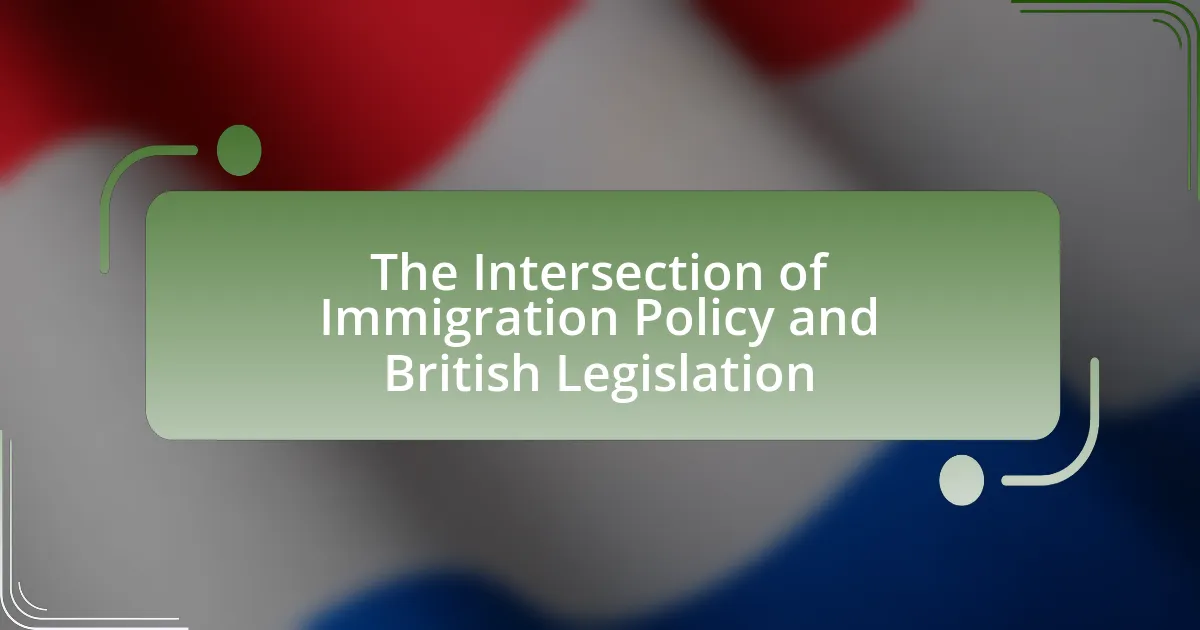The Freedom of Information Act (FOIA) in the UK, enacted in 2000, provides the public with the right to access information held by public authorities, promoting transparency and accountability in government operations. This article evaluates the effectiveness of the FOIA, examining its key provisions, the definition of public authorities, and the challenges faced in its implementation, such as compliance issues and response delays. It also discusses the impact of the Act on public access to information, the statistics surrounding information requests, and potential reforms to enhance its effectiveness. Additionally, best practices for submitting requests and resources for understanding the Act are outlined, providing a comprehensive overview of the FOIA’s role in fostering an informed citizenry.

What is the Freedom of Information Act in the UK?
The Freedom of Information Act in the UK is a law that grants the public the right to access information held by public authorities. Enacted in 2000, the Act aims to promote transparency and accountability in government by allowing individuals to request information and receive responses within a specified timeframe. The Act applies to various public bodies, including government departments, local authorities, and the National Health Service, ensuring that citizens can scrutinize the actions and decisions of these entities.
How does the Freedom of Information Act function?
The Freedom of Information Act (FOIA) functions by granting the public the right to access information held by public authorities in the UK. This legislation requires public bodies to respond to requests for information, ensuring transparency and accountability. Under the FOIA, individuals can request documents and data, and public authorities are obligated to provide this information unless it falls under specific exemptions, such as national security or personal privacy. The Act was established in 2000 and has since facilitated greater public engagement with government operations, evidenced by the thousands of requests processed annually, which highlight its role in promoting openness in governance.
What are the key provisions of the Freedom of Information Act?
The key provisions of the Freedom of Information Act include the right of individuals to access information held by public authorities, the obligation of these authorities to publish certain information proactively, and the establishment of a framework for requesting information. Specifically, the Act mandates that public bodies respond to requests for information within 20 working days and provides exemptions for sensitive information, such as national security or personal data. These provisions aim to promote transparency and accountability in government operations, as evidenced by the increase in public requests for information since the Act’s implementation in 2005, which has led to greater scrutiny of public spending and decision-making processes.
How does the Act define public authorities?
The Act defines public authorities as bodies that are established by statute or are publicly funded and perform functions of a public nature. This includes government departments, local authorities, and other organizations that carry out public duties. The definition is grounded in the need for transparency and accountability in public administration, ensuring that entities receiving public funds or exercising public functions are subject to scrutiny under the Freedom of Information Act.
What is the purpose of the Freedom of Information Act?
The purpose of the Freedom of Information Act is to promote transparency and accountability in government by granting the public the right to access information held by public authorities. This legislation, enacted in the UK in 2000, allows individuals to request information and requires public bodies to respond, thereby fostering an informed citizenry and enhancing democratic governance. The Act aims to ensure that government actions are open to scrutiny, which is essential for maintaining public trust and enabling citizens to participate effectively in the democratic process.
Why was the Freedom of Information Act enacted?
The Freedom of Information Act was enacted to promote transparency and accountability in government by granting the public the right to access information held by public authorities. This legislation, passed in the UK in 2000, aimed to empower citizens to scrutinize government actions and decisions, thereby enhancing democratic governance. The Act was a response to growing demands for openness and was influenced by similar laws in other countries, reflecting a global trend towards greater public access to government information.
How does the Act promote transparency and accountability?
The Freedom of Information Act promotes transparency and accountability by granting the public the right to access information held by public authorities. This access enables citizens to scrutinize government actions and decisions, fostering a culture of openness. For instance, since its implementation in 2005, the Act has led to thousands of requests for information, revealing previously undisclosed data and enhancing public understanding of governmental processes. This increased visibility into governmental operations serves as a check on power, ensuring that public officials are held accountable for their actions.

How effective is the Freedom of Information Act in practice?
The Freedom of Information Act (FOIA) is moderately effective in practice, facilitating public access to government information but facing challenges in implementation. Research indicates that while the Act has increased transparency, with over 800,000 requests made in 2020 alone, compliance rates vary significantly among public authorities, often leading to delays and refusals. A study by the Information Commissioner’s Office revealed that around 40% of requests were not fully met, highlighting issues in responsiveness and the quality of information provided. Thus, while the FOIA serves as a crucial tool for accountability, its effectiveness is hindered by inconsistent application and bureaucratic obstacles.
What challenges does the Freedom of Information Act face?
The Freedom of Information Act faces several challenges, including government resistance to transparency, excessive redaction of information, and delays in response times. Government entities often cite exemptions to deny requests, which can hinder public access to information. A report by the Information Commissioner’s Office in 2021 indicated that 40% of requests were either fully or partially refused, highlighting the issue of excessive redaction. Additionally, the average response time for requests can exceed the statutory limit of 20 working days, further complicating the effectiveness of the Act.
How do public authorities respond to information requests?
Public authorities respond to information requests by assessing the request’s validity, determining if the information is held, and then either providing the requested information or citing exemptions under the Freedom of Information Act. The process typically involves a formal acknowledgment of the request, a timeframe for response, and a decision on whether to disclose the information based on legal criteria. According to the Information Commissioner’s Office, public authorities are required to respond within 20 working days, ensuring transparency and accountability in their operations.
What are common reasons for refusal of requests?
Common reasons for refusal of requests under the Freedom of Information Act in the UK include exemptions related to national security, personal data protection, and commercial interests. National security concerns often lead to the withholding of information that could compromise the safety of the state or its citizens. Personal data protection is invoked to safeguard individuals’ privacy, preventing the release of information that could identify them. Additionally, commercial interests may be cited to protect sensitive business information that, if disclosed, could harm a company’s competitive position. These reasons are grounded in specific sections of the Freedom of Information Act, which outline the legal framework for such refusals.
What impact has the Freedom of Information Act had on public access to information?
The Freedom of Information Act (FOIA) has significantly enhanced public access to information by allowing individuals to request and obtain information held by public authorities. Since its implementation in the UK in 2005, the FOIA has empowered citizens to hold government bodies accountable, leading to increased transparency in public administration. For instance, in 2020, the Information Commissioner’s Office reported that over 70,000 requests were made under the FOIA, illustrating its widespread use and impact on promoting openness. This legislation has also resulted in the release of critical information regarding government spending, decision-making processes, and public services, thereby fostering a more informed citizenry.
How has the Act influenced government transparency?
The Freedom of Information Act (FOIA) has significantly enhanced government transparency by granting the public the right to access information held by public authorities. This legislation has led to increased accountability, as government bodies are now required to disclose information upon request unless specific exemptions apply. For instance, since its implementation in 2005, the FOIA has resulted in thousands of requests annually, revealing previously undisclosed government activities and decisions, thereby fostering a culture of openness. Studies indicate that the Act has empowered citizens and journalists to scrutinize government actions more effectively, contributing to a more informed public and a more accountable government.
What are the statistics on information requests and responses?
In the UK, statistics on information requests and responses under the Freedom of Information Act indicate that in 2021, public authorities received approximately 80,000 requests. Of these, around 70% were fully granted, while 20% were either partially granted or refused. The Information Commissioner’s Office reported that the average response time for these requests was 18 days, which is within the statutory limit of 20 working days. These figures demonstrate a high compliance rate among public authorities in responding to information requests, reflecting the effectiveness of the Freedom of Information Act in promoting transparency.

What improvements can be made to the Freedom of Information Act?
Improvements to the Freedom of Information Act (FOIA) can include enhancing response times, increasing transparency in exemptions, and providing better resources for requesters. Specifically, the average response time for FOIA requests can be reduced from the current average of 20 working days to a more efficient timeframe, ensuring timely access to information. Additionally, clarifying the criteria for exemptions would help the public understand why certain information is withheld, as studies indicate that vague exemptions lead to confusion and distrust. Finally, allocating more funding and training for public authorities can empower them to handle requests more effectively, as evidenced by the backlog of requests that often occurs due to insufficient staffing and resources.
How can the effectiveness of the Freedom of Information Act be enhanced?
The effectiveness of the Freedom of Information Act can be enhanced by implementing stricter compliance measures for public authorities. Stricter compliance can ensure that requests are processed in a timely manner, as studies show that delays in response can undermine public trust. For instance, the Information Commissioner’s Office reported that in 2020, 40% of requests were not answered within the statutory timeframe, indicating a need for improved adherence to deadlines. Additionally, increasing public awareness and accessibility of the Act can empower citizens to utilize their rights effectively, as evidenced by research from the Campaign for Freedom of Information, which found that many individuals remain unaware of their rights under the Act.
What reforms have been proposed to strengthen the Act?
Proposed reforms to strengthen the Freedom of Information Act in the UK include extending the scope of the Act to cover more public bodies and private organizations that perform public functions. Additionally, recommendations suggest reducing the time limit for responses to requests from 20 days to a shorter period, enhancing the penalties for non-compliance, and improving the clarity of exemptions to prevent misuse. These reforms aim to increase transparency and accountability in government operations, as highlighted by various advocacy groups and reports emphasizing the need for more robust access to information.
How can public awareness of the Act be increased?
Public awareness of the Freedom of Information Act in the UK can be increased through targeted educational campaigns and community engagement initiatives. These campaigns can utilize social media platforms, public workshops, and informational materials to inform citizens about their rights under the Act. Research indicates that public knowledge of the Act is limited; for instance, a 2020 study by the Information Commissioner’s Office found that only 36% of the public were aware of their rights to access information. By leveraging partnerships with local organizations and employing clear, accessible messaging, awareness can be significantly enhanced, leading to greater public participation in utilizing the Act.
What best practices can be adopted for utilizing the Freedom of Information Act?
To effectively utilize the Freedom of Information Act (FOIA), individuals should adopt best practices such as clearly defining the information sought, using precise language in requests, and being aware of the exemptions that may apply. Clearly defining the information helps agencies understand the request, while precise language minimizes ambiguity, increasing the likelihood of a successful response. Understanding exemptions, such as national security or personal data, allows requesters to frame their inquiries in a way that avoids potential rejection. Additionally, maintaining a record of all correspondence and responses can facilitate follow-up actions and appeals if necessary. These practices enhance the efficiency and effectiveness of the FOIA process, as evidenced by increased successful requests reported by organizations that implement them.
How can individuals effectively submit information requests?
Individuals can effectively submit information requests by clearly identifying the information sought, specifying the relevant public authority, and using a formal written format. The Freedom of Information Act in the UK allows individuals to request information held by public authorities, and requests should be concise and specific to facilitate a prompt response. According to the Information Commissioner’s Office, requests must include the requester’s name and address, and they should be made in writing, which can include email. This structured approach increases the likelihood of receiving a comprehensive and timely response.
What resources are available for understanding the Freedom of Information Act?
Resources available for understanding the Freedom of Information Act include government websites, legal textbooks, and academic articles. The UK government’s official website provides comprehensive information about the Act, including guidance on how to make requests and the rights it grants to the public. Legal textbooks, such as “Freedom of Information: A Practical Guide” by David Banisar, offer in-depth analysis and case studies. Additionally, academic articles published in journals like the “Journal of Information Policy” examine the Act’s implications and effectiveness, providing critical insights and empirical data. These resources collectively enhance understanding of the Freedom of Information Act and its application in the UK.




